Explanatory material about the new policy and the model contract ...
Explanatory material about the new policy and the model contract ...
Explanatory material about the new policy and the model contract ...
You also want an ePaper? Increase the reach of your titles
YUMPU automatically turns print PDFs into web optimized ePapers that Google loves.
The Government’s Intellectual Property Policy <strong>and</strong> ICT Contracts<br />
<strong>Explanatory</strong> Material<br />
Information <strong>about</strong> <strong>the</strong> New Policy<br />
1. Procuring information <strong>and</strong> communication technology – supplier to own<br />
<strong>the</strong> intellectual property in <strong>the</strong> developed software<br />
For information <strong>and</strong> communication technology (ICT) procurement <strong>contract</strong>s relating to<br />
developed software, agencies that are subject to <strong>the</strong> Financial Management <strong>and</strong><br />
Accountability Act 1997 (FMA Act) need to adopt a default position (or a starting <strong>contract</strong>ual<br />
position) in favour of <strong>the</strong> ICT supplier owning <strong>the</strong> intellectual property (IP) in <strong>the</strong> software<br />
<strong>the</strong> supplier develops under <strong>the</strong> <strong>contract</strong>.<br />
An agency is still required to conduct an IP needs analysis (see chapter 7 of <strong>the</strong> Australian<br />
Government Intellectual Property Manual) to determine whe<strong>the</strong>r <strong>the</strong> Commonwealth should<br />
retain IP ownership (for example, <strong>the</strong> Commonwealth might need to retain IP ownership to<br />
ensure <strong>the</strong> IP is licensed under open source terms or for reasons of national security).<br />
However, an agency’s starting position in its analysis is to be <strong>the</strong> default position described<br />
above.<br />
Importantly, if an agency adopts <strong>the</strong> default position, <strong>the</strong> position is to be conditional on <strong>the</strong><br />
supplier granting <strong>the</strong> Commonwealth a perpetual, irrevocable, world-wide (if required),<br />
royalty free, fully paid up licence to all rights normally accompanying IP ownership<br />
(including a right to sub-license but excluding a right of commercial exploitation) in <strong>the</strong><br />
developed IP for government activities. Where <strong>the</strong> supplier is not willing to agree to <strong>the</strong><br />
whole-of-government licence, <strong>the</strong> supplier should not retain ownership of <strong>the</strong> IP <strong>and</strong> a<br />
<strong>contract</strong>ual negotiation process should occur to determine IP rights.<br />
The exclusion of a right of commercial exploitation should not be regarded as extending to<br />
circumstances where an agency seeks <strong>the</strong> services of ano<strong>the</strong>r ICT supplier to modify, enhance<br />
or fur<strong>the</strong>r develop <strong>the</strong> software for <strong>the</strong> agency for government purposes on commercial terms.<br />
The Commonwealth’s ability to sub-license <strong>the</strong> developed software does not extend to sublicensing<br />
<strong>the</strong> IP to non-government or government entities for commercial exploitation. The<br />
sub-licence only extends to non-commercial use of <strong>the</strong> developed software for government<br />
activities.<br />
It is for an agency to determine when use of <strong>the</strong> developed software is for ‘government<br />
activities’. However, ‘government activities’ should be regarded as extending to include<br />
circumstances where an agency decides to share its developed software with a State or<br />
Territory Government.<br />
1
2. Commencement of <strong>the</strong> <strong>policy</strong><br />
The <strong>policy</strong> applies to ICT <strong>contract</strong> negotiations starting from 1 October 2010. It does not<br />
have retrospective application. Accordingly, <strong>the</strong> <strong>policy</strong> does not apply to ICT procurement<br />
<strong>contract</strong>s negotiated <strong>and</strong> finalised before 1 October 2010 nor to <strong>contract</strong> negotiations which<br />
were commenced prior to 1 October 2010 but which have not yet been finalised.<br />
3. Application of <strong>the</strong> <strong>policy</strong><br />
The <strong>policy</strong> is contained in <strong>the</strong> Intellectual Property Principles for Australian Government<br />
Agencies (Statement of IP Principles) which applies to agencies subject to <strong>the</strong> FMA Act. For<br />
agencies subject to <strong>the</strong> Commonwealth Authorities <strong>and</strong> Companies Act 1997 (CAC Act), as<br />
with <strong>the</strong> Statement of IP Principles generally, <strong>the</strong>se agencies may consider <strong>the</strong> <strong>new</strong> <strong>policy</strong> an<br />
expression of good practice.<br />
4. Scope of <strong>the</strong> <strong>policy</strong><br />
The following are excluded from <strong>the</strong> scope of <strong>the</strong> <strong>policy</strong>:<br />
<br />
<br />
IP in ICT products that is governed by open source licences, <strong>and</strong><br />
IP that includes or contains personal information.<br />
ICT procurement <strong>contract</strong>s only<br />
The Government’s <strong>policy</strong> centres on procurement <strong>contract</strong>s only. Contracts, such as<br />
employment <strong>contract</strong>s, are not covered by <strong>the</strong> <strong>policy</strong>. For example, <strong>the</strong> <strong>policy</strong> does not apply<br />
to a situation where an agency intends for its employees to develop software ‘in-house’. The<br />
<strong>policy</strong> is directed at external ICT providers to <strong>the</strong> Commonwealth <strong>and</strong> applies where an<br />
agency ‘outsources’ <strong>the</strong> development of software.<br />
However, even if an agency outsources development of software, an agency may still rely on<br />
one of <strong>the</strong> exceptions (such as national security or law enforcement purposes) to own <strong>the</strong> IP<br />
in <strong>the</strong> developed software where necessary.<br />
5. Relying upon an exception - <strong>the</strong> Commonwealth retains IP ownership<br />
An agency’s starting <strong>contract</strong>ual position should be <strong>the</strong> default position established by <strong>the</strong><br />
<strong>policy</strong>. However, if <strong>the</strong>re are exceptional reasons, <strong>the</strong>n an agency may enter <strong>the</strong> procurement<br />
negotiations with a view to retaining IP ownership in <strong>the</strong> developed software. Principle 8(a)<br />
provides a non exhaustive list of reasons where it may be necessary for <strong>the</strong> Commonwealth to<br />
retain IP ownership. When evaluating whe<strong>the</strong>r to depart from <strong>the</strong> default position, agencies<br />
should also take into account any Government policies that relate to how an agency should<br />
determine IP ownership in relation to ICT IP or IP generally.<br />
The reasons listed in Principle 8(a) were developed following consultation with agencies<br />
during <strong>the</strong> development of <strong>the</strong> <strong>policy</strong>.<br />
2
Model Contract Clauses<br />
The <strong>model</strong> <strong>contract</strong> clauses have been designed by a working group of agencies, including<br />
<strong>the</strong> Attorney-General’s Department <strong>and</strong> <strong>the</strong> Departments of Finance <strong>and</strong> Deregulation <strong>and</strong><br />
Innovation, Industry, Science <strong>and</strong> Research, to assist agencies to implement <strong>the</strong> <strong>policy</strong>. The<br />
clauses are ‘<strong>model</strong>’ <strong>and</strong> may, in certain parts, be adapted or tailored by an agency to suit its<br />
procurement <strong>contract</strong> templates. The clauses are only a snapshot of a procurement <strong>contract</strong><br />
<strong>and</strong> <strong>the</strong>refore are likely to require tailoring to suit an agency’s <strong>contract</strong> template.<br />
The <strong>model</strong> <strong>contract</strong> clauses set out <strong>the</strong> default position agencies must adopt when entering<br />
any <strong>new</strong> procurement <strong>contract</strong> for software from 1 October 2010 unless <strong>the</strong>re is an<br />
exceptional reason for <strong>the</strong> Commonwealth to own <strong>the</strong> IP in <strong>the</strong> developed software. The<br />
clauses also set out <strong>the</strong> whole-of-government Commonwealth licence <strong>the</strong> ICT supplier should<br />
provide to <strong>the</strong> agency in return for IP ownership.<br />
6. Additional terms to <strong>the</strong> <strong>model</strong> <strong>contract</strong> clauses<br />
It is for an agency to determine whe<strong>the</strong>r to negotiate additional terms, including pricing<br />
concessions, discounts or free access to upgrades, enhancements <strong>and</strong> <strong>new</strong> products based on<br />
<strong>the</strong> original or commercial version of <strong>the</strong> developed software. For example, see <strong>the</strong> drafting<br />
note in relation to clause 17.<br />
7. Optional clauses<br />
The <strong>model</strong> <strong>contract</strong> clauses also contain some suggested ‘optional’ clauses. It is for an<br />
agency to determine whe<strong>the</strong>r to include <strong>the</strong>se clauses in its negotiations. For example, some<br />
of <strong>the</strong> optional clauses (such as <strong>the</strong> clauses on warranties) may already exist elsewhere in <strong>the</strong><br />
<strong>contract</strong> <strong>and</strong> <strong>the</strong>refore may not be required.<br />
Clause 7 contains <strong>the</strong> optional expression ‘world-wide’. Agencies should include this term if<br />
it is necessary for <strong>the</strong>ir use. For example, <strong>the</strong> term may be necessary where <strong>the</strong> software<br />
needs to be used at an overseas Australian embassy post.<br />
An optional clause for ownership of IP by <strong>the</strong> Commonwealth has not been included in <strong>the</strong><br />
<strong>model</strong> <strong>contract</strong> clauses. If this option is selected for exceptional reasons, agencies should use<br />
existing template clauses for this purpose, in consultation with <strong>the</strong>ir legal advisers.<br />
8. Definitions used in <strong>the</strong> <strong>model</strong> <strong>contract</strong> clauses<br />
Many of <strong>the</strong> definitions used in <strong>the</strong> <strong>model</strong> <strong>contract</strong> clauses are based on definitions used in<br />
<strong>the</strong> Department of Finance <strong>and</strong> Deregulation’s SourceIT <strong>model</strong> <strong>contract</strong>s – see<br />
.<br />
Accordingly, an agency may determine that some of <strong>the</strong><br />
definitions in <strong>the</strong> <strong>model</strong> <strong>contract</strong> clauses need to be adjusted to suit <strong>the</strong> agency’s internal<br />
<strong>contract</strong> templates.<br />
3
However, <strong>the</strong>re are certain key terms used in <strong>the</strong> <strong>model</strong> <strong>contract</strong> clauses that an agency<br />
should avoid altering as <strong>the</strong>y have been carefully drafted to reflect <strong>the</strong> scope <strong>and</strong> nature of <strong>the</strong><br />
<strong>policy</strong>.<br />
These terms are:<br />
Agency – This definition has been deliberately limited to agencies subject to <strong>the</strong> FMA Act.<br />
This is because <strong>the</strong> <strong>new</strong> <strong>policy</strong> is part of <strong>the</strong> Statement of IP Principles <strong>and</strong> <strong>the</strong> Principles<br />
only apply to <strong>the</strong>se agencies. CAC Act agencies may consider principle 8(a) to be an<br />
expression of good practice in IP management <strong>and</strong> may apply <strong>the</strong> principle to <strong>the</strong>ir<br />
negotiations <strong>and</strong> <strong>contract</strong> templates as <strong>the</strong>y determine to be appropriate.<br />
Associated Documentation <strong>and</strong> Associated Tools - These definitions are designed to ensure<br />
that <strong>the</strong> Customer receives adequate documentation <strong>and</strong> tools to allow <strong>the</strong> developed software<br />
to be properly used <strong>and</strong> for it to function properly.<br />
Developed Software – This term should not be replaced with ‘foreground IP’. The <strong>policy</strong> is<br />
deliberately limited to <strong>the</strong> supplier (‘Contractor’) receiving ownership of <strong>the</strong> IP in <strong>the</strong><br />
developed software only.<br />
Commercial Exploitation – The Government determined that <strong>the</strong> licence to <strong>the</strong><br />
Commonwealth from <strong>the</strong> supplier is not to include a right of commercial exploitation for <strong>the</strong><br />
Commonwealth. However, this does not prevent an agency from renaming <strong>the</strong> expression<br />
‘commercialisation’ instead of ‘commercial exploitation’ as long as <strong>the</strong> essential definition<br />
remains unchanged.<br />
Software <strong>and</strong> Tools – These definitions ensure <strong>the</strong> ability for <strong>the</strong> Agency <strong>and</strong> <strong>the</strong><br />
Commonwealth more broadly to use <strong>the</strong> Contractor’s software <strong>and</strong> tools if needed to allow<br />
<strong>the</strong> proper functioning of <strong>the</strong> developed software.<br />
The terms Contract, Harmful Code <strong>and</strong> Open Source Licence are based on, or taken from,<br />
<strong>the</strong> Department of Finance <strong>and</strong> Deregulation’s SourceIT <strong>model</strong> <strong>contract</strong>s <strong>and</strong> may be varied<br />
as required by <strong>the</strong> agency.<br />
9. References to ‘Commonwealth’<br />
The references to ‘Commonwealth’ throughout <strong>the</strong> clauses reflect <strong>the</strong> scope, extent <strong>and</strong><br />
nature of <strong>the</strong> <strong>policy</strong>. An agency needs to receive a licence for <strong>the</strong> Commonwealth (not just<br />
<strong>the</strong> Agency) to use <strong>the</strong> developed IP. Accordingly, <strong>the</strong> references to ‘Commonwealth’ in <strong>the</strong><br />
<strong>model</strong> <strong>contract</strong> clauses are deliberate.<br />
10. References to ‘Customer’<br />
The references to ‘Customer’ in <strong>the</strong> <strong>model</strong> <strong>contract</strong> clauses are intended to clarify when<br />
clauses specifically relate to <strong>the</strong> <strong>contract</strong>ing agency ra<strong>the</strong>r than any agency that is subject to<br />
<strong>the</strong> FMA Act. For example, see clause 5 – Provision of Associated Documentation.<br />
4
However, <strong>the</strong>re are o<strong>the</strong>r instances in <strong>the</strong> <strong>model</strong> <strong>contract</strong> clauses where it is necessary to<br />
make clear that <strong>the</strong> clause specifically relates more broadly to agencies subject to <strong>the</strong> FMA<br />
Act. For example, see clause 12 (no obligation to receive support, maintenance, etc or o<strong>the</strong>r<br />
services from <strong>the</strong> Contractor) <strong>and</strong> clause 13 (ability to rely on licence to Commonwealth even<br />
if <strong>the</strong> agency is not party to <strong>the</strong> <strong>contract</strong>).<br />
11. Terms of <strong>the</strong> licence to <strong>the</strong> Commonwealth<br />
An agency should not modify <strong>the</strong> terms of <strong>the</strong> licence to <strong>the</strong> Commonwealth from <strong>the</strong><br />
supplier in clauses 7–13 as <strong>the</strong> terms reflect <strong>the</strong> scope of <strong>the</strong> <strong>policy</strong>.<br />
Definition of ‘use’<br />
The word ‘use’ in clause 7 (‘any use for government activities’) is intended to cover a broad<br />
range of activities, including copying, reproduction, adaptation, modification, enhancing,<br />
distributing, communicating etc. It should not be restricted in scope.<br />
An agency may replace <strong>the</strong> word ‘use’ with a more detailed list of <strong>the</strong> permitted activities if it<br />
considers it necessary.<br />
12. Why has a definition of ‘intellectual property’ not been included in <strong>the</strong><br />
<strong>model</strong> clauses?<br />
Since <strong>the</strong> <strong>model</strong> <strong>contract</strong> clauses only reflect part of <strong>the</strong> entire procurement <strong>contract</strong> or<br />
agreement that an agency will be using, IP may be defined elsewhere in <strong>the</strong> agency’s <strong>contract</strong><br />
template.<br />
13. Why are <strong>the</strong> words ‘all relevant intellectual property’ used in clause 2?<br />
The expression ‘all relevant intellectual property’ is used in clause 2 because not all types of<br />
intellectual property may be relevant (for example, ‘circuit layouts’).<br />
Only intellectual property rights relevant to <strong>the</strong> Developed Software, Associated<br />
Documentation <strong>and</strong> Associated Tools are to be covered in <strong>the</strong> licence.<br />
To avoid ambiguity or debate between <strong>contract</strong>ing parties as to <strong>the</strong> intellectual property rights<br />
covered in clause 2, agencies should clearly identify what constitutes <strong>the</strong> Developed<br />
Software, Associated Documentation or Associated Tools in <strong>the</strong>ir <strong>contract</strong>. The <strong>contract</strong>ing<br />
agency is in <strong>the</strong> best position to do this. In doing so, an agency may redraft <strong>the</strong> phrase ‘all<br />
relevant intellectual property rights’ to be more specific if <strong>the</strong> agency considers it necessary.<br />
14. Source code <strong>and</strong> <strong>the</strong> definition of ‘Developed Software’<br />
To ensure an agency’s ability to use <strong>and</strong> fur<strong>the</strong>r develop <strong>the</strong> source code for <strong>the</strong> developed<br />
software, <strong>the</strong> definition of ‘Developed Software’ has been defined to include ‘source code’.<br />
5
15. What is <strong>the</strong> difference between clauses 4 <strong>and</strong> 15?<br />
Clause 4 states that <strong>the</strong> Contractor needs to provide <strong>the</strong> Customer with <strong>the</strong> Developed<br />
Software, Associated Documentation <strong>and</strong> Associated Tools that have been created by <strong>the</strong><br />
Contractor in relation to <strong>the</strong> Developed Software, at a certain point. This is necessary to<br />
allow <strong>the</strong> Customer <strong>and</strong> o<strong>the</strong>r agencies that rely on <strong>the</strong> licence to be able to use <strong>the</strong> software<br />
<strong>and</strong> to ensure <strong>the</strong> developed software functions.<br />
Clause 15 centres on <strong>the</strong> situation where <strong>the</strong>re are Tools that have not been created by <strong>the</strong><br />
Contractor specifically in relation to <strong>the</strong> Developed Software but <strong>the</strong> use of <strong>the</strong> Tools is<br />
necessary to allow an agency to rely on <strong>the</strong> licence provided to <strong>the</strong> Commonwealth.<br />
16. The requirement to provide up to date Associated Documentation (clause 5)<br />
Clause 5 provides that <strong>the</strong> Contractor is to provide <strong>the</strong> Customer with up to date Associated<br />
Documentation that allows <strong>the</strong> Customer to make full use of <strong>the</strong> Developed Software.<br />
This clause does not create an obligation for <strong>the</strong> Contractor to ‘update’ <strong>the</strong> Associated<br />
Documentation throughout <strong>the</strong> life of <strong>the</strong> Developed Software. Ra<strong>the</strong>r, clause 5 is only<br />
directed at <strong>the</strong> initial or first occasion when <strong>the</strong> Contractor provides <strong>the</strong> Associated<br />
Documentation to <strong>the</strong> Customer. The clause is intended to ensure <strong>the</strong> quality of <strong>the</strong> <strong>material</strong><br />
provided to <strong>the</strong> Customer so that <strong>the</strong> Developed Software may be used by <strong>the</strong> Customer.<br />
17. Clause 18 – open source software<br />
This optional clause is based on <strong>the</strong> open source software clause contained in <strong>the</strong> SourceIT<br />
<strong>model</strong> <strong>contract</strong>s. An agency may determine whe<strong>the</strong>r it is necessary <strong>and</strong> / or needs to be<br />
modified.<br />
18. Clause 19 – software warranties<br />
Similarly, this clause is based on clauses from <strong>the</strong> SourceIT <strong>model</strong> <strong>contract</strong>s <strong>and</strong> if an agency<br />
chooses to retain <strong>the</strong> clause, it may be modified as necessary.<br />
6


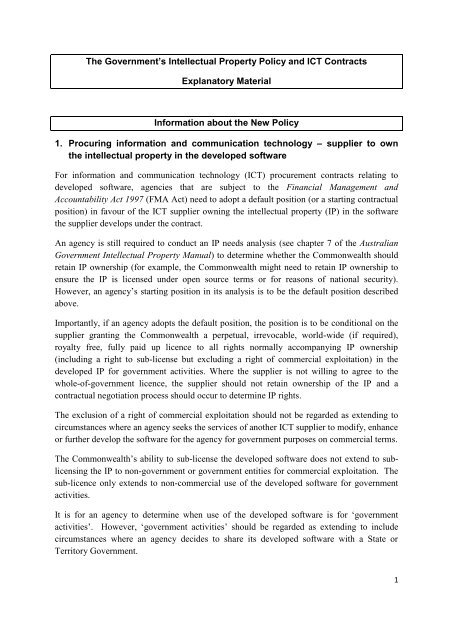

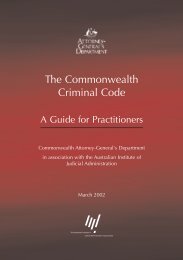
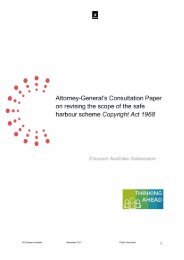

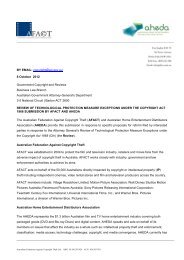

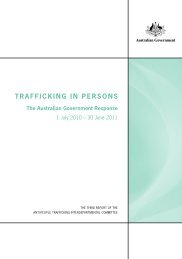
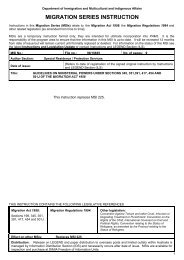
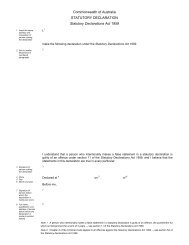
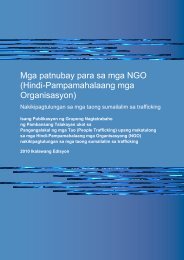
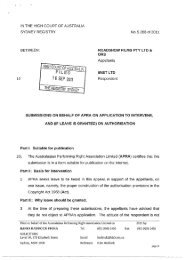
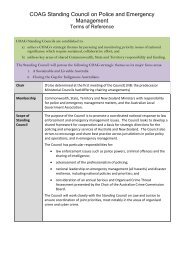

![Normann Witzleb [PDF 657KB] - Attorney-General's Department](https://img.yumpu.com/26247895/1/184x260/normann-witzleb-pdf-657kb-attorney-generals-department.jpg?quality=85)